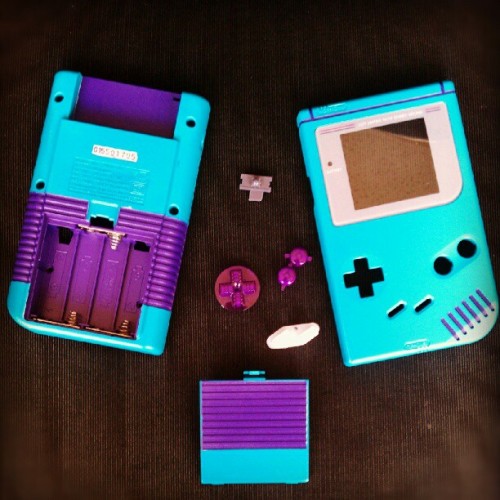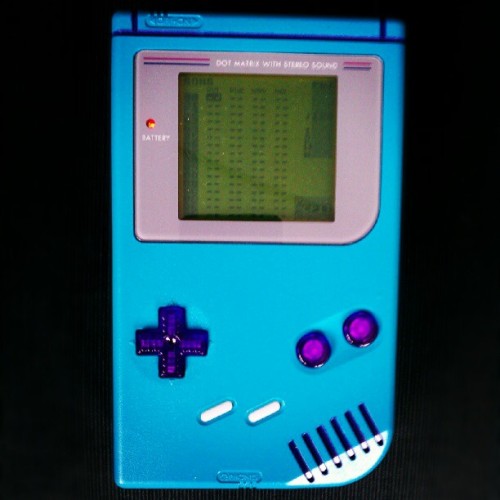Well, I found the documentation (for some reason I overlooked it on the Arduinoboy page...). I'm going to be working on a MaxMSP patch that makes up for some of mGB's weaknesses... stay tuned.
17 Dec 5, 2012 5:37 am
Re: mGB glitch, and some questions about mGB (6 replies, posted in Nintendo Handhelds)
18 Dec 5, 2012 3:23 am
Topic: mGB glitch, and some questions about mGB (6 replies, posted in Nintendo Handhelds)
I'm not sure where to post this, but I figured that if I posted it here the people that need to see it will. I finally got mGB working with my new nanoloop USB. I have my midi keyboard sending midi to a simple patch in MaxMSP which I use to manipulate which channels are sent to the NanoUSB. Everything works fantastic, except for one issue.
If I turn the touch response on my keyboard off (or if the velocities for all my notes are the same), the 'sustain' function does not behave properly on PU2. Here is an audio clip that demonstrates what is happening:
https://www.dropbox.com/s/2r8ekzs8n1gk5 … glitch.mp3
And this is what I am doing in this clip:
1. Play simple staccato phrase with sustain function OFF to midi channel 1 (PU1)
2. Play same phrase with sustain function ON to midi channel 1
3. Play same phrase with sustain function OFF to midi channel 2 (PU2)
4. Play same phrase with sustain function ON to midi channel 2
It seems like when the velocities do not change on channel 2, mGB changes notes without retriggering the note. When I send notes to midi channel 5 with the sustain function ON on all channels, PU2 shows the same behavior and is simply silent when it gets to that channel's turn to play.
This begs the question- how are you supposed to correctly send note messages without retrigger messages, or retrigger messages without note messages to mGB?
Where can I find documentation on what midi messages do what on the mGB? I want to be able to change pulse width, panning, envelop, etc on the fly. I know this is possible, but how?
Would it be possible to release a tool that allows you to paste the bytes for replacing some of those noise WAV patterns with your own? Or at the very least the ROM location, so I can change it with my hex editor?
Since the NanoUSB is easy and cheap, mGB is becoming a much more plausible tool for many of us. Is there any reason why mGB is not open source?
19 Dec 4, 2012 9:04 pm
Re: Customized gear thread (1,206 replies, posted in Nintendo Handhelds)
20 Dec 3, 2012 9:57 am
Re: Nanoloop USB MIDI adapter makes backlight glow. can it damage stuff? (14 replies, posted in Nintendo Handhelds)
Does this mean your batteries won't drain as much when you've got this baby plugged in?
21 Nov 29, 2012 10:47 pm
Re: LSDJ Draining my Batteries? (9 replies, posted in Nintendo Handhelds)
Or better yet, buy Ni-MH rechargeable ones and a charger. You won't regret it.
This this this this
22 Nov 27, 2012 11:50 pm
Re: Any interested in custom board Arduinoboys? (47 replies, posted in Nintendo Handhelds)
+1, Interested
23 Nov 18, 2012 3:56 am
Re: DMG all in one USB for power, sound and MIDI ... is it possible? (39 replies, posted in Nintendo Handhelds)
A couple things to consider:
1. I remember someone saying that LSDJ is more prone to slowdown with weak batteries, which probably means that lowering the voltage will produce the same effect. I'd try your voltage tests again with a CPU intensive LSDJ song.
2. If I remember correctly, the iMic had noticeable latency last time I used it. I was using one from when it first came out, over 10 years ago, so things may have improved, but I'd check this out
24 Oct 25, 2012 8:49 pm
Re: Someone Please Help (2 replies, posted in Nintendo Handhelds)
That would be great! Lets continue this via PM
25 Oct 25, 2012 8:22 pm
Topic: Someone Please Help (2 replies, posted in Nintendo Handhelds)
I have an old EMS cart that I purchased in a bundle off eBay that has corrupt. I accidentally left it in my DMG while on overnight, and the batteries had died when I found it in the morning. When I loaded it up with new batteries, most of my songs don't play correctly, or take forever to load. I don't have a cart transfer thing to try and get the SAV file off the cart. Is there anyone out there that is willing to help? I can send you the cart if you can get the SAV file off of it. From there, I can send it to Nitro2k01 and he can possibly salvage the songs.
I can pay shipping both ways!
26 Sep 2, 2012 4:13 am
Re: GBC BASS MOD (25 replies, posted in Tutorials, Mods & How-To's)
This is great- can you post a third comparison of a DMG playing the same song sample? If the bass is comparable, I may need to transition to the GBC!
27 Aug 31, 2012 6:20 am
Re: Drag'n'Derp: the gameboy cart to end all gameboy carts (705 replies, posted in Nintendo Handhelds)
I just used a proxy site to buy a smart boy cart and transferer from taobao, really good deal actually.
Can you elaborate on how to do this exactly?
29 Aug 17, 2012 8:44 am
Re: Customized gear thread (1,206 replies, posted in Nintendo Handhelds)
This is the raddest DMG I've ever seen. Without a doubt.
Call me crazy, but I can see this getting even radder. I love this gameboy so much that I photoshopped what I think it's screaming for:
+ White backlight
+ Matching purple screen protector
30 Aug 16, 2012 4:36 am
Re: LSDJ Organ patch – how? (8 replies, posted in Nintendo Handhelds)
So I decided to experiment with organ sounds today because of this thread, and here's the result:
https://www.dropbox.com/s/ngtxd5ycpfdbw … -organ.mp3
Quick and dirty proof of concept. As herr_prof, suggested, I layered a PU2 channel on top of the WAV channel to get a fuller sound.
Here are pictures of the waveform/instruments/tables:
Waveform-
https://www.dropbox.com/s/abib19jm735vzq2/IMAG0075.jpg
WAV instrument-
https://www.dropbox.com/s/scnroziokyrxwcm/IMAG0076.jpg
WAV table-
https://www.dropbox.com/s/l4aryrrsllcczpf/IMAG0077.jpg
PU2 instrument-
https://www.dropbox.com/s/jijf0vkdxrqvyxj/IMAG0078.jpg
PU2 table-
https://www.dropbox.com/s/obcnryxajiol6tx/IMAG0080.jpg
Some notes about the audio:
0:00 - 0:19: WAV + PU2 Organ in context
0:19 - 0:39: WAV without PU2 in context
0:39 - 0:58: WAV + PU2 alone
0:59 - 1:14: WAV alone
1:14 - 1:36: WAV + PU2 in context (reprise)
The PU2 makes the organ sound much fuller, but just the WAV sounds almost as good. Some tweaks to this organ sound could include:
changing the PU2 fine tune
changing the vibrato (for both)
changing the envelop/table for the PU2 to have more or less of an attack added to the sound
Let me know what you guys think!
31 Aug 16, 2012 1:04 am
Re: LSDJ Organ patch – how? (8 replies, posted in Nintendo Handhelds)
What kind of organ? Hammond? Reed? Pipe?






